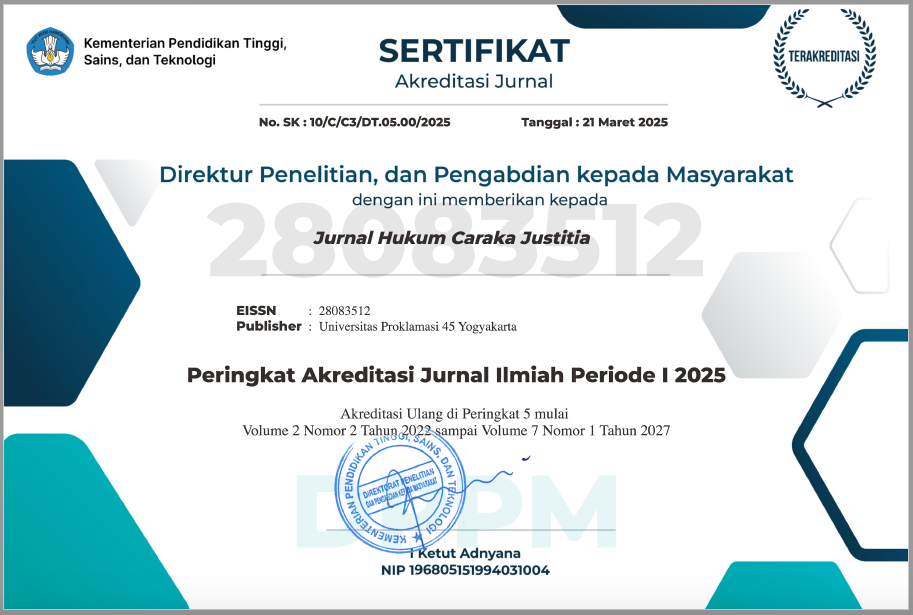Perlindungan Hukum Bagi Konsumen dan Pemegang Merek Terdaftar dari Pemanfaatan Merek Terkenal
DOI:
https://doi.org/10.30588/jhcj.v2i2.1403Keywords:
Famous Brands, Legal Protection, Registered Brand Holders, Consumers.Abstract
The tendency of consumers to buy and use famous brands is a lifestyle for some people in this modern era. Considering that generally goods/services of well-known brands have a relatively more expensive sale value when compared to non-branded goods/services, so their existence is often used by parties who are not responsible for producing counterfeit goods/ services or selling counterfeit goods/services with us and utilize well-known brands. Therefore the use of a well-known trademark that has been registered by another unauthorized party will bring legal impact and loss to many parties, the first party that loses is the owner of the registered brand, and this will lead to fraudulent competition, the second party to be disadvantaged is the consumer community who buy and consume counterfeit products using well-known brands which should be protected from misleading behavior, other parties who are also disadvantaged by the use of well-known brands are the government/country in addition to not getting fees from the distribution of these well-known brands will also affect the country's image from the international business environment. In this study, the author tries to find out how the form of legal protection against "Famous brand holders" and against "Cosmetics" from the illegal use of famous brands and what needs to be done by the government to protect the practice of using registered (well-known) brands from the use of parties who are not entitled to.
References
Artikel Jurnal
Arifin, Zaenal. “Muhammad Iqbal Perlindungan Hukum Terhadap Merek yang Terdaftar”. Jurnal Ius Constituendum 5, no. 1 (April 2020): 47-65. https://journals.usm.ac.id/index.php/jic/article/download/2117/1483.
Dewi, Nourma, & Tunjung Baskoro. “Kasus Sengketa Merek Prada S.A Dengan PT. Manggala Putra Perkasa Dalam Hukum Perdata Internasional”. Jurnal Ius Constituendum 4, no. 1 (April 2019): 18-27. https://journals.usm.ac.id/index.php/ jic/article/viewFile/1531/1018.
Kowel, Fandi H. “Perlindungan Hukum Terhadap Penerima Lisensi Merek Di Indonesia”. Jurnal Lex et Societatis V, no. 3 (Mei 2017): 53-58. https://ejournal.unsrat.ac.id/ index.php/lexetsocietatis/article/download/15575/15113.
Santoso, Edy. “Penegakan Hukum Terhadap Pelanggaran Merek Dagang Melalui Peran Kepabeanan Sebagai Upaya Menjaga Keamanan dan Kedaulatan Negara”. Jurnal Rechtsvinding 5, no. 1 (April 2016): 117-134. https://rechtsvinding.bphn.go.id/ jurnal/137557jurnal%20volume%205%20no%201_final%20protect.pdf#page=137.
Buku
Jened, Rahmi. Hukum Merk (Trademark Law). Jakarta: Prenadamedia Group, 2015.
Miru, Ahmadi. Prinsip-Prinsip Perlindungan Hukum Bagi Konsumen di Indonesia. Jakarta: PT. Raja Grafindo Persada, 2013.
Artikel Online
Amrikasari, Risa. “Perlindungan Merek Terkenal Berdasarkan Hukum di Indonesia”. https://www.hukumonline.com/klinik/a/perlindungan-merek-terkenal-berdasarkan-hukum-di-indonesia-lt5941f01d7fa0e/ (diakses 15 Desember 2022).
Peraturan Perundang-Undangan
Undang-Undang Nomor 5 Tahun 1999 tentang Larangan Praktik Monopoli dan Persaingan Usaha Tidak Sehat.
Undang-Undang Nomor 8 Tahun 1999 tentang Perlindungan Konsumen.
Undang-Undang Nomor 15 Tahun 2001 tentang Merek.
Downloads
Published
How to Cite
Issue
Section
License
Copyright (c) 2023 Benedictus Renny See

This work is licensed under a Creative Commons Attribution 4.0 International License.
Authors who publish with JHCJ agree to the following terms:
Authors retain copyright and grant the JHCJ right of first publication with the work simultaneously licensed under a Creative Commons Attribution 4.0 International License that allows others to share (copy and redistribute the material in any medium or format) and adapt (remix, transform, and build upon the material) the work for any purpose, even commercially with an acknowledgment of the work's authorship and initial publication in JHCJ.
Authors are able to enter into separate, additional contractual arrangements for the non-exclusive distribution of the journal's published version of the work (e.g., post it to an institutional repository or publish it in a book), with an acknowledgment of its initial publication in JHCJ. Authors are permitted and encouraged to post their work online (e.g., in institutional repositories or on their website) prior to and during the submission process, as it can lead to productive exchanges, as well as earlier and greater citation of published work (See The Effect of Open Access).














